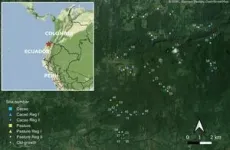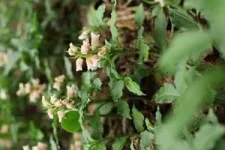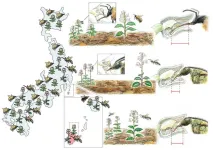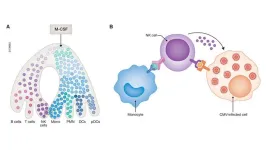(Press-News.org) For many people seaweed holds a reputation as a superfood, heralded for its health benefits and sustainability, but it appears our European ancestors were ahead of the game and were consuming the nutrient-rich plant for thousands of years.
Researchers say they have found “definitive” archaeological evidence that seaweeds and other local freshwater plants were eaten in the mesolithic, through the Neolithic transition to farming and into the Early Middle Ages, suggesting that these resources, now rarely eaten in Europe, only became marginal much more recently.
The study, published in Nature Communications, reveals that while aquatic resources were exploited, the archaeological evidence for seaweed is only rarely recorded and is almost always considered in terms of non-edible uses like fuel, food wrappings or fertilisers.
Historical accounts report laws related to collection of seaweed in Iceland, Brittany and Ireland dating to the 10th Century, while sea kale is mentioned by Pliny as a sailor’s anti-scurvy remedy.
By the 18th Century seaweed was considered as famine food, and although seaweed and freshwater aquatic plants continue to be economically important in parts of Asia, both nutritionally and medicinally, there is little consumption in Europe.
The team, led by archaeologists from the universities of Glasgow and York, examined biomarkers extracted from dental calculus from 74 individuals from 28 archaeological sites across Europe, from north Scotland to southern Spain, which revealed “direct evidence for widespread consumption of seaweed and submerged aquatic and freshwater plants.”
Samples where biomolecular evidence survived revealed consumption of red, green or brown seaweeds, or freshwater aquatic plants, with one sample from Orkney also containing evidence for a Brassica, most likely sea kale.
There are approximately 10,000 different species of seaweeds in the world, however only 145 species are eaten today, principally in Asia.
The researchers hope that their study will highlight the potential for including more seaweeds and other local freshwater plants in our diets today - helping Europeans to become healthier and more sustainable.
Karen Hardy, Professor of Prehistoric Archaeology at the University of Glasgow and Principal Investigator of the Powerful Plants project, said: “Today, seaweed and freshwater aquatic plants are virtually absent from traditional, western diets and their marginalisation as they gradually changed from food to famine resources and animal fodder, probably occurred over a long period of time, as has also been detected elsewhere with some plants.
“Our study also highlights the potential for rediscovery of alternative, local, sustainable food resources that may contribute to addressing the negative health and environmental effects of over-dependence on a small number of mass-produced agricultural products that is a dominant feature of much of today’s western diet, and indeed the global long-distance food supply more generally.”
“It is very exciting to be able to show definitively that seaweeds and other local freshwater plants were eaten across a long period in our European past.”
Co author on the paper, Dr Stephen Buckley, from the Department of Archaeology at the University of York, said “The biomolecular evidence in this study is over three thousand years earlier than historical evidence in the Far East.
“Not only does this new evidence show that seaweed was being consumed in Europe during the Mesolithic Period around 8,000 years ago when marine resources were known to have been exploited, but that it continued into the Neolithic when it is usually assumed that the introduction of farming led to the abandonment of marine dietary resources.
“This strongly suggests that the nutritional benefits of seaweed were sufficiently well understood by these ancient populations that they maintained their dietary link with the sea.”
END
Study reveals our European ancestors ate seaweed and freshwater plants
For many people seaweed holds a reputation as a superfood, heralded for its health benefits and sustainability, but it appears our European ancestors were ahead of the game and were consuming the nutrient-rich plant for thousands of years.
2023-10-17
ELSE PRESS RELEASES FROM THIS DATE:
Effects of the million hearts model on heart attacks, strokes, and Medicare spending
2023-10-17
About The Study: The Million Hearts Model, which encouraged and paid health care organizations to assess and reduce cardiovascular disease (CVD) risk, reduced first-time heart attacks and strokes. The results support guidelines to use risk scores for CVD primary prevention.
Authors: Laura Blue, Ph.D., of Mathematica in Washington, D.C., is the corresponding author.
To access the embargoed study: Visit our For The Media website at this link https://media.jamanetwork.com/
(doi:10.1001/jama.2023.19597)
Editor’s Note: Please see the article for additional ...
Climate network analysis helps pinpoint regions at higher risk of extreme weather
2023-10-17
WASHINGTON, Oct. 17, 2023 – Climate change and the rapid increase in frequency of extreme weather events around the globe – such as wildfires and floods – reinforces the reality that these events are not only not random but, rather, interconnected. Interlinked climate behavior, or teleconnections, isn’t a well understood field but will be necessary to fully comprehend how our climate system works.
In Chaos, from AIP Publishing, a team of researchers affiliated with Beijing Normal University and Beijing University of Posts and Telecommunications in China and the Potsdam Institute for Climate Impact Research in Germany describes a climate network analysis method to explore ...
Race and ethnicity and prehospital use of opioid or ketamine analgesia in acute traumatic injury
2023-10-17
About The Study: The results of this study of over 4.7 million patient encounters across the U.S. during a 3-year period suggest that patients from racial and ethnic minority groups with acute traumatic injuries do not have their pain treated equitably in the prehospital setting.
Authors: Eli Carrillo, M.D., of the Stanford University School of Medicine in Stanford, California, is the corresponding author.
To access the embargoed study: Visit our For The Media website at this link https://media.jamanetwork.com/
(doi: 10.1001/jamanetworkopen.2023.38070)
Editor’s Note: Please see the article for additional ...
Adult attention-deficit/hyperactivity disorder and the risk of dementia
2023-10-17
About The Study: In this study of 109,000 individuals born between 1933 and 1952 and followed up in old age, adult attention-deficit/hyperactivity disorder (ADHD) was associated with an increased risk of dementia. Policy makers, caregivers, patients, and clinicians may wish to monitor reliably for ADHD in old age.
Authors: Stephen Z. Levine, Ph.D., of the University of Haifa in Haifa, Israel, is the corresponding author.
To access the embargoed study: Visit our For The Media website at this link https://media.jamanetwork.com/
(doi: 10.1001/jamanetworkopen.2023.38088)
Editor’s Note: Please see the article for additional information, including ...
AI models identify biodiversity from animal sounds in tropical rainforests
2023-10-17
Tropical forests are among the most important habitats on our planet. They are characterised by extremely high species diversity and play an eminent role in the global carbon cycle and the world climate. However, many tropical forest areas have been deforested and overexploitation continues day by day.
Reforested areas in the tropics are therefore becoming increasingly important for the climate and biodiversity. How well biodiversity develops on such areas can be monitored very well with an automated analysis of animal sounds. This was reported by researchers in the journal Nature Communications.
Recordings on Former Cocoa Plantations and Pastures
As part of the DFG research group ...
Recognizing clinical signs of hyperthyroidism leads to appropriate treatments, reduces adverse impact on health
2023-10-17
(Boston)—Untreated hyperthyroidism, conditions where there is excess thyroid hormone present, can adversely affect health, leading to increased risks for abnormal heart rhythms, heart failure, osteoporosis, adverse pregnancy outcomes, metabolic abnormalities and increased mortality risk. Hyperthyroidism can occur due to several different etiologies, including Graves’ disease, toxic (overactive) thyroid nodules, and thyroiditis. It is important to recognize, correctly diagnose, and appropriately treat the underlying cause of hyperthyroidism to minimize its impacts on health.
In a new review article in the Journal ...
Adults with ADHD are at increased risk for developing dementia
2023-10-17
Adults with attention-deficit/hyperactivity disorder (ADHD) are nearly three times more likely to develop dementia than adults without ADHD, according to a Rutgers study.
The study, coauthored by Michal Schnaider Beeri, director of the Herbert and Jacqueline Krieger Klein Alzheimer’s Research Center at Rutgers Brain Health Institute (BHI) was published in JAMA Network Open. It followed more than 100,000 older adults in Israel over 17 years to examine if adults with ADHD are at increased risk for dementia, including Alzheimer’s disease.
Although more than 3 percent of the adult population in the United States has ADHD, there is limited research ...
Orchid without bumblebee on island finds wasp, loses self
2023-10-17
Because the bumblebee that an orchid relies on for pollination does not exist on a remote island, the plant gets pollinated by an island wasp. Kobe University researchers found that this came at the cost of being hybridized with another orchid species adapted to being pollinated by the wasp. The finding showcases how plants in ecological relationships adapt to changing circumstances.
Remote islands have been exciting study grounds for biologists since at least the days of Darwin. When studying ecological relationships between different species, the differences between mainland and island ...
Ocean circulation, ice melt and increasing tourism could all be contributing to Arctic microplastics
2023-10-17
Scientists measured microplastic concentrations in the highly productive Barents Sea and suggest that ocean circulation, ice melt, tourism, inadequate waste management, shipping and fishing are all likely contributors.
Numerous studies have shown that global microplastic quantities in the marine environment are increasing, even in remote locations such as the Arctic.
The Barents Sea, which adjoins the Arctic Ocean, is one of the most productive oceanic areas in the world and home to an enormous diversity of organisms.
It is also a key route for Atlantic ...
Boosting weak immune system: scientists find an unusual weapon against virus
2023-10-17
Some viruses can be dormant throughout a person’s life and cause no harm but become dangerous when the immune system is weakened. One of such viruses is human cytomegalovirus (CMV). Harmless to the general public but life-threatening to patients with a supressed immune system.
“Patients undergoing bone marrow transplantations have their blood and immune system fully replaced by that of the donor. In the first months after transplantation they are defenseless. They can either catch CMV or have virus reactivated that was dormant in the patient. At the moment, there is no ideal treatment. The available ones work ...
LAST 30 PRESS RELEASES:
Nanoplastics can interact with Salmonella to affect food safety, study shows
Eric Moore, M.D., elected to Mayo Clinic Board of Trustees
NYU named “research powerhouse” in new analysis
New polymer materials may offer breakthrough solution for hard-to-remove PFAS in water
Biochar can either curb or boost greenhouse gas emissions depending on soil conditions, new study finds
Nanobiochar emerges as a next generation solution for cleaner water, healthier soils, and resilient ecosystems
Study finds more parents saying ‘No’ to vitamin K, putting babies’ brains at risk
Scientists develop new gut health measure that tracks disease
Rice gene discovery could cut fertiliser use while protecting yields
Jumping ‘DNA parasites’ linked to early stages of tumour formation
Ultra-sensitive CAR T cells provide potential strategy to treat solid tumors
Early Neanderthal-Human interbreeding was strongly sex biased
North American bird declines are widespread and accelerating in agricultural hotspots
Researchers recommend strategies for improved genetic privacy legislation
How birds achieve sweet success
More sensitive cell therapy may be a HIT against solid cancers
Scientists map how aging reshapes cells across the entire mammalian body
Hotspots of accelerated bird decline linked to agricultural activity
How ancient attraction shaped the human genome
NJIT faculty named Senior Members of the National Academy of Inventors
App aids substance use recovery in vulnerable populations
College students nationwide received lifesaving education on sudden cardiac death
Oak Ridge National Laboratory launches the Next-Generation Data Centers Institute
Improved short-term sea level change predictions with better AI training
UAlbany researchers develop new laser technique to test mRNA-based therapeutics
New water-treatment system removes nitrogen, phosphorus from farm tile drainage
Major Canadian study finds strong link between cannabis, anxiety and depression
New discovery of younger Ediacaran biota
Lymphovenous bypass: Potential surgical treatment for Alzheimer's disease?
When safety starts with a text message
[Press-News.org] Study reveals our European ancestors ate seaweed and freshwater plantsFor many people seaweed holds a reputation as a superfood, heralded for its health benefits and sustainability, but it appears our European ancestors were ahead of the game and were consuming the nutrient-rich plant for thousands of years.






